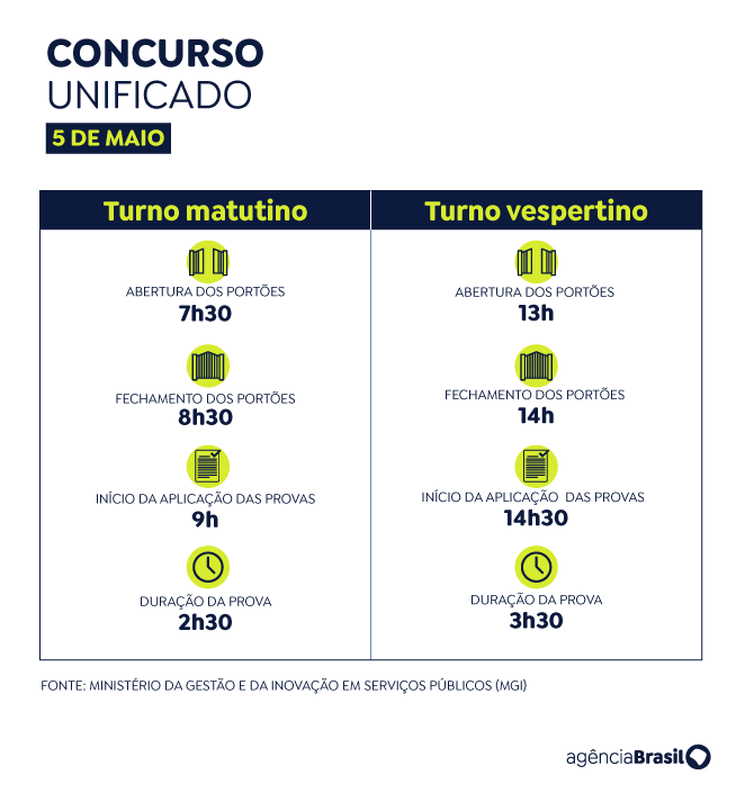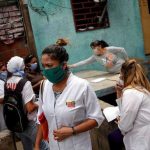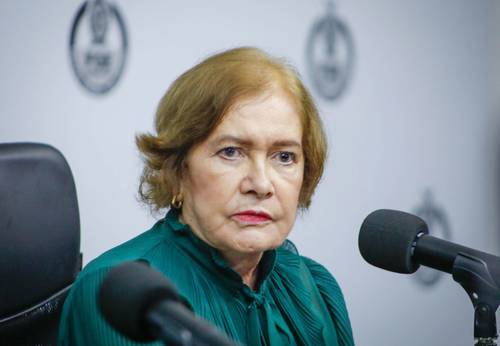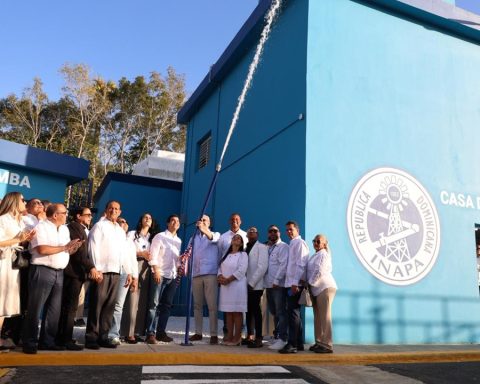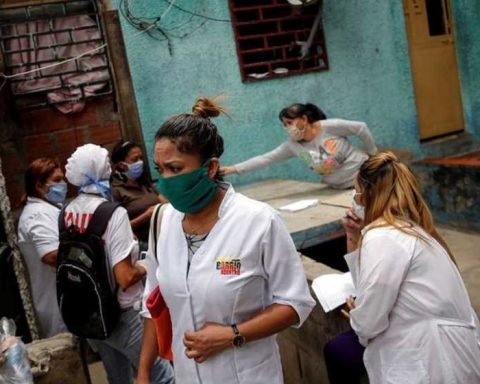The time has come. This Sunday, about 2.1 million people are expected at test sites across the country to take the first Unified National Public Exam, which offers 6,640 vacancies for 21 federal public administration bodies. It is the largest public exam in the history of Brazil.
In the morning, the gates will open and close at 7:30 and 8:30, respectively, Brasília time. The test will start at 9:00 a.m. and will last two hours and 30 minutes, ending at 11:30 a.m. However, candidates who need more time to complete the tests and requested additional time at the time of registration for special assistance will end the test at 12:30 p.m.
In the afternoon, participants must return to the test site. The gates will reopen at 1:00 p.m. and close at 2:00 p.m. The tests will begin at 2:30 p.m., and candidates will have three hours and 30 minutes to answer the questions in the contest, that is, until 6:00 p.m. For candidates who requested additional time to complete the tests, the contest will close at 7:00 p.m.
Each candidate could apply to only one thematic block and, within the same block, ranked the desired positions in order of preference. Blocks 1 to 7 require higher education. The education level for block 8 is secondary or technical level.
Security and logistics
The logistics of the selection process relies on the 25 years of experience of the National Institute of Studies and Educational Research Anísio Teixeira (INEP), of the Ministry of Education (MEC), in administering the National High School Exam (ENEM), which inspired this competition. Hence, the nickname “ENEM of Competitions”.
This Sunday, around 215 thousand employees will be involved in security and logistics for the application of the unified competition.
The event also has reinforced security in an integrated enforcement network of several public agencies, created by the Ministry of Management and Innovation in Public Services (MGI). The Federal Police, the Federal Highway Police (PRF), the Brazilian Intelligence Agency (Abin) and the National Public Security Force provide support in the logistics and security of the event. Specifically, the National Force already operates in eight states: Roraima, Rio Grande do Sul, Mato Grosso, Amazonas, Rio de Janeiro, Pará, Mato Grosso do Sul and Maranhão.
What to bring
Although not mandatory, MGI recommends take the registration confirmation cardbecause it contains the test location. The document is available in the candidate area, with a login using the CPF and password registered in the account on the federal government’s Single Portal, Gov.br. The card contains, among other information, the registration number, date, time, and test room number.
Identification with an original photo ID, whether physical or digital, is mandatory. The latter (digital CNH, Digital RG and E-Título) will need to be in the respective digital document applications downloadable from the applications.
Candidates must bring a black pen made of transparent material to use on the day of the exam. Blue pens, pencils, erasers and other materials cannot be left on the candidate’s desk during the exam.
Participants may bring food and water on the day of the race. Food must be in intact, sealed packaging and water bottles must be transparent.
Transit
MGI recommends that candidates arrive at the test site at least two hours before the start of each test period.
Several cities that will host the Unified National Public Competition (CPNU), this Sunday (18), set up special traffic and public transport scheme to assist the participants of the event.
In the Federal District, there will be an increase in public transportation. Companies must operate lines with weekday travel schedules, observing the times of the competition activities, from the arrival of the coordination team at the test locations until the end.
In the capital of São Paulo, the Traffic Engineering Company (CET) suspended the Leisure Cycle Lane this Sunday (18), which are exclusive areas for bicycles that operate on Sundays and holidays, from 7 am to 4 pm, on specific avenues in the city. The measure aims to facilitate the movement of candidates, leaving traffic free for buses and vehicles.
In Rio de Janeiro, 125,500 people are expected to take part in the races. Some roads in the south and downtown areas will be closed for the Rio International Half Marathon, which starts at 6:40 a.m. The runners will run along Vieira Souto Avenue, Francisco Otaviano Street, Atlantic Avenue, Princesa Isabel Avenue, Botafogo Bay (two laps), Aterro do Flamengo, General Justo Avenue and Alfred Agache Avenue, where they will return to Aterro. The race will end at Aterro do Flamengo, near Cuauhtemoc Square. Public transportation will also be reinforced in the city.
The Salvador Department of Urban Mobility (Semob) reported that 34 regulatory fleet vehicles will be made available from 6 am to 7 pm this Sunday. The buses will be distributed between the stations of Lapa, Mussurunga, Pirajá, Águas Claras and Terminal Acesso Norte, at the disposal of the inspection team, and may be used if a greater demand is identified.
In Natal, 27,600 people are expected to participate in the competition. To meet demand, 34 bus lines will be reinforced and will carry out 604 trips throughout the day.
In Porto Alegre, the locations with the highest concentration of applicants, such as PUC-RS, Fapa and Uniritter, will have reinforcements on several bus lines.
Next steps
The complete schedule with the next scheduled dates for the main stages of the competition can be accessed at MGI website.
The final results are expected to be released on November 21. The calls for the inauguration of those approved and for entry into training courses for specific positions are scheduled for January 2025.
* Article updated at 08:40 to add information.


